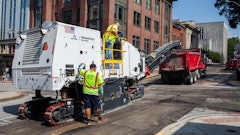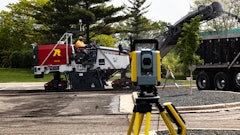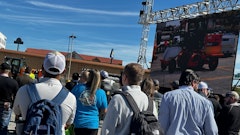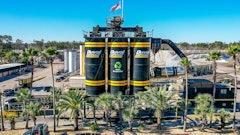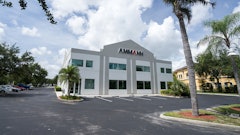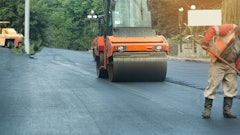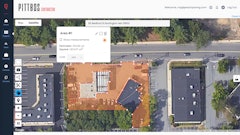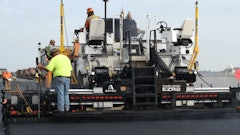
A good housekeeper knows you shouldn't take a dirty plate to a car wash to get it cleaned. A good paving contractor knows you shouldn't use a 50,000--lb. mainline paver to lay down a 600--sq.--ft. driveway. The reason is efficiency. Efficiency saves time, effort and, most important to a businessperson, money.
The roadbuilding industry offers plenty of options to help a commercial paving contractor keep its business running efficiently. A commercial paver is any paver not utilized in mainline, interstate paving. The machines in this size class are recognized by their versatility and ability to tackle many different types of jobs.
Within this group are pavers in the 16,000--lb. range, which would commonly be used for patch work, residential driveways, subdivision additions, street overlays, parking lots and anything up to and including city streets. On the larger end of the spectrum are 20,000-- to 30,000--lb. machines for paving large parking lots and driveways, city streets and county and state highways.
"Honestly, both machines cross over and do many of the same jobs," says John Hood, manager, paving product development and sales with Bomag Paving Products. "It's really not so much the paver classification as the contractor classification that determines which machine he uses."
Which machine size is best for you?
Bigger doesn't always mean better, which you need to remember if you're in the market for a commercial class paver. Your main goal should be efficiency, and you can accomplish this only if you have the right paver for your company. To find the right paver, consider what kinds of jobs you feel comfortable bidding on, and what types of jobs you expect to get.
If the bulk of your paving will be residential driveway jobs and small parking lots, but you still want to reserve the ability to take on city street jobs when possible, you might want to consider a paver in the 16,000--lb. class. These pavers are highly efficient when put to work on the types of paving projects they were designed to perform.
"It was dandy when all our parking lots where just big squares 25 years ago, but now everyone has to have the aesthetic value with fountains and curbs with rock gardens and trees everywhere," Hood says. "That lends itself to the smaller commercial class pavers because they are so much more maneuverable."
Mark Bolick, service manager with LeeBoy, explains that the shorter screeds on the smaller commercial pavers are also helpful in tight quarters and on smaller jobs, allowing you to move your paver closer to a building or curb.
"You can take a big paver and pave anything, but the productivity becomes lower because you have more hand work to do," Bolick explains. "A paver [in the 16,000--lb. class] basically eliminates a lot of the hand work."
If most of your paving is done in large, open spaces such as Wal--Mart parking lots or municipal, county and state roads'what many in the industry consider mainlining' but you still want the ability to take on some smaller jobs, then you should consider a machine on the larger end of the commercial paver spectrum.
"[Having the larger machine] gives the contractor a lot more versatility for the jobs that he can bid," says Bill Rieken, paving applications specialist with Terex Cedarapids. "He can bid the commercial work and still take on a large project even though he has a commercial size paver."
Bob Nittinger, regional manager for northeast and mid--Atlantic at Dynapac, notes that with a large commercial class paver like Dynapac's F25 Series, a contractor could lay down a lot of asphalt in a day under ideal paving situations with efficient truck support.
"You could crank through 300 to 400 tph without any problem. Most plants can't produce that kind of productivity," he says. "But 325 tph through an 8--ft. paver is very unusual. The average will be about 150 to 180 tph over the course of a day'that would be if he's mainlining."
Despite these tonnage capabilities, contractors need to remember that larger commercial class pavers are best utilized in commercial applications.
"A contractor might want to go to a larger machine if he's doing more highway class work that requires paving with automation for smoothness, and if ride quality is a criterion for how he's paid," Rieken says. "Longer wheelbased machines have better self--leveling characteristics and inherently give you better ride because of the physical size."
With the 16,000--lb. class pavers, you could expect to get about 1,000 tons per day through your paver. These tonnages are only estimates, however, because each job will be different. Your work will also be limited by the ability to make sure your paver'regardless of size'and crew are always kept busy.
"All paving machines are limited by the ability to keep asphalt flowing through them," Hood says. "I don't care where you go in this country, everywhere you see paving crews sitting and waiting for mix."
Hood says another distinction to consider when deciding which end of the commercial paver spectrum to buy from is personnel availability.
"It will sometimes take up to five crew members and a minimum of three to operate those [20,000-- to 30,000--lb.] machines. Many of the smaller commercial class pavers can be operated with two or even one man," Hood points out. "So depending on the actual contractor and his business make--up, his business plan will determine the size of the machine he selects."
Mobility choices
There are three mobility systems you can choose from with a commercial class paver: rubber tire, steel track and rubber track, also known as "rubber band".
Dynapac's Nittinger says the rubber tire systems are popular in small pockets across the country where they have been commonly used in those areas for generations. Outside of those pockets, however, he says rubber tire systems generally fill a niche within the industry."Rubber tire systems are mainly for roading," Nittinger explains. "You'll find the majority of contractors who are in highway maintenance work want the wheel unit because they can 'road it' from one area to another at about 12.5 mph. With the rubber band, you can go up to 10 mph, but with the steel track you can only go about 4 mph. A wheel unit runs a lot smoother, whereas a track unit sometimes gets a little bounce to it.'
Where rubber tires seem to run into problems'on steeper grades or on challenging sub--bases'a track system shines. Steel tracks are the industry standard, although rubber track systems have been growing in popularity in recent years.
"The advantage of rubber track over steel track is that it has almost the same high speed mobility as the rubber tire paver," Rieken says. "Not only is the rubber track smooth and fast, it's not going to mark up a preexisting mat. And we've engineered a system that stops a paver from moving when it's in de--track mode. This prevents a rubber track from slipping off and becoming damaged."
On smaller commercial class pavers, where the steel tracks are less aggressive because of the lighter weight of the machine, many units are still requested with the steel track systems.
"We at Bomag believe that the rubber band track does not have the longevity to work in a commercial paving application as of yet, with all that twisting and turning and obstructions," Hood says. He adds, however, that as Bomag adds heavier pavers to its product line, both rubber tire and rubber track options will be available on those machines.
Examine all options
As a commercial paving contractor, you have many options and factors to consider when looking for the paving machine that will maximize your company's efficiency. The types of jobs you work on and the size crew you can support will be leading factors in your decision. Further research will bring you to examine auger systems and the variety of screed options available across the manufacturers.
Sometimes making a decision between pavers is nearly impossible, and you will commonly see a contractor that owns commercial pavers of different sizes to accommodate its business plan.











